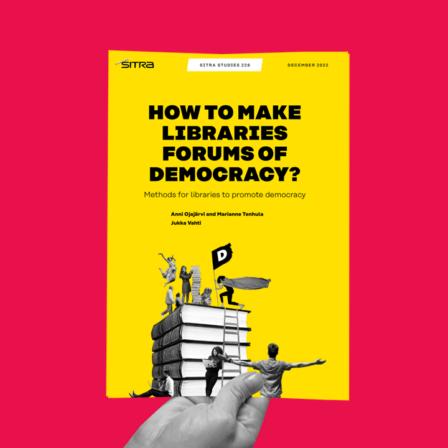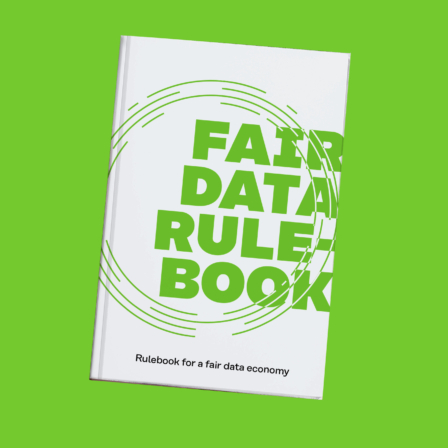Data has been said to be the world’s most valuable resource. Therefore, the discussion about corporate social responsibility should also be expanded to the use and sharing of data. It is topical, because as many as 49% of companies already share data (PDF) with other companies. There is a lot of room for improvement in how and to whom data is shared. For example, it is noteworthy that corporations share less data than SMEs (small and medium-sized enterprises).
The data from SMEs usually flows to corporations as supply chain data flows, but why is the data not moving in the opposite direction? For example, a company supplying metal sheets required for the manufacture of a bucket on a wheel loader could supply even better alloys if it received data back about the service hours of the bucket, operating temperatures and, for example, bucket load data. Sharing data in the opposite direction would thereby benefit both parties. This is the right time to discuss the societal impacts of data sharing more extensively.
Follow the example – share data with fair rules!
The development of the corporate world is driven by a trend where all business is becoming service business. Companies can only succeed in the market by offering services customised to meet customers’ individual needs. This requires data, or information about the behaviour and needs of customers. When the promise of the value of data is high, companies fight tooth and nail to keep the data they have collected. Paradoxically, this very attitude prevents the use of data and the fulfilment of the promise.
How can small companies or companies that have just entered a market compete with large corporations that use data? It is crucial to increase and diversify the amount of data available to everyone.
The General Data Protection Regulation General Data Protection Regulation (GDPR) Regulation (EU) 2016/679, the European Union’s ("EU") new General Data Protection Regulation ("GDPR"), regulates the processing by an individual, a company or an organisation of personal data relating to individuals in the EU. Open term page General Data Protection Regulation (GDPR) (GDPR) has laid down a safe framework for the use and reuse of data. Currently, consumers have the right to transfer data collected about them by a service, such as purchase data, to another service to use. In practice, this does not work yet, because the interfaces and joint operating methods are missing. In order to make the reuse of data possible, it is crucial that large companies are willing to open up their data to use by smaller parties. For the time being, no SME can use row-specific data about daily grocery purchases or banking data or data about electricity and energy consumption.
The will, information and means of reform do exist. Who will be the first one?
OP’s corporate study 2020 reveals that the majority of large corporations want to be trailblazers in reforming their industry. As many as 69% of the respondents want to promote development by, for example, engaging in co-operation with start-ups.
However, talk is not enough. There need to be concrete methods and the courage to test what kinds of new services could emerge if companies began to open up their data for use by other companies and societal actors, while utilising data collected by others. In fact, we challenge Kesko, S-Group, Stockmann, Elisa, Telia and other large Finnish corporations to become pioneers of the European data economy.
So, how are the first steps towards a new operating model to be taken? Companies should first identify the internal and external data flows: data is primarily generated by providing products and services, and the company can use the data thus generated itself or share it with others.
A Sitra-funded study by the Research Institute of the Finnish Economy (Etla) investigates the value of shared data in industrial and service value chains. According to the study, a company’s data resources should be divided into four categories:
- a company’s proprietary data
- data shared with trusted partners
- data shared with other stakeholders
- open data.
When a company categorises its data repositories according to this model and creates a data strategy, it can share data with others and receive data from other companies.
Many companies commenced such work as part of the GDPR project. Now, they should continue the work and resolve issues such as how to integrate third-party data into their own data and how a company could share data to create added value for its own customers.
Sharing and using data in a fair way is part of responsible business.
There are already tools for realising this. For example, we have prepared a rulebook with our partners, offering a framework for new data networks to share data easier, more transparently and more safely.
By taking swift action, large companies will not be left out in the cold. Opening up their data allows big firms to offer smaller companies an opportunity to enter the market and improve their own service offering together with new partners. Nordea Accounting Plus is a good example of this. By opening up an interface to the Ukko.fi service, Nordea has been able to offer services that meet the needs of small corporate customers better without taking responsibility for developing them itself.
In companies, the importance of responsibility has already changed from charity and management of reputation risk to a strategic opportunity. We encourage large corporations to draw up a data strategy that includes identifying the data that can be used for service development by others. We believe that this allows companies to retain their competitiveness in the long term in a rapidly changing market. At the same time, the data also benefits other companies and the development of society.
Sitra’s IHAN project and FIBS will organise a joint Making data part of corporate social responsibility workshop series (link in Finnish) in spring 2020. The workshops will identify and share best practices for the sustainable use of data from the point of view of corporate social responsibility. The theme will also be investigated with an open survey in Finland (link in Finnish).
#IHAN #corporateresponsibility #socialresponsibility

















Recommended
Have some more.